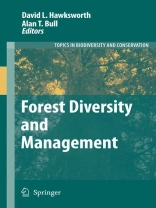Natural forests with thousands of years of ecological continuity are unrivalled as the treasure store of terrestrial biodiversity on Earth. And while there is currently no fully comprehensive inventory of the biota associated with any given forest, it is reasonable to assume that in conserving natural forests we can conserve the myriads of unnamed bacteria, fungi, insects, mites and nematodes that forests support.
Drawing on diverse research from biodiversity experts around the world, this collection of papers reflects the diversity of forest types and forest issues that concern forest scientists globally. Forest types considered vary from savannah and tropical rainforests to the ancient oak forests of Poland; issues explored include the effects of logging, management practices, forest dynamics and climate change on forest structure and biodiversity.
Tabla de materias
Dynamics in natural mixed-beech forest of the Upper Vosges.- The effects of climate change on the long-term conservation of Fagus grandifolia var. mexicana, an important species of the Cloud Forest in Eastern Mexico.- Genetic diversity of Dalbergia monticola (Fabaceae) an endangered tree species in the fragmented oriental forest of Madagascar.- Forest management and plant species diversity in chestnut stands of three Mediterranean areas.- Spatial diversity of dry savanna woodlands.- Assessment of threat status and management effectiveness in Kakamega Forest, Kenya.- Influence of forest types and effects of forestry activities on species richness and composition of Chrysomelidae in the central mountainous region of Japan.- The banana forests of Kilimanjaro: biodiversity and conservation of the Chagga homegardens.- Biodiversity hotspots and conservation priorities in the Campo-Ma’an rain forests, Cameroon.- Tree diversity in western Kenya: using profiles to characterise richness and evenness.- Vascular plant species inventory of a Philippine lowland rain forest and its conservation value.- Status and conservation of Trigonobalanus doichangensis (Fagaceae).- Ghyll woodlands of the Weald: characterisation and conservation.- Effects of fragmentation of evergreen broad-leaved forests on genetic diversity of Ardisia crenata var. bicolor (Myrsinaceae).- Diversity patterns in the flora of the Campo-Ma’an rain forest, Cameroon: do tree species tell it all?.- Impacts of selective logging and agricultural clearing on forest structure, floristic composition and diversity, and timber tree regeneration in the Ituri Forest, Democratic Republic of Congo.- Forest management considerations for conservation of Black Woodpecker Dryocopus martius and White-backed Woodpecker Dendrocoposleucotos populations in Quinto Real (Spanish Western Pyrenees).- A reconsideration of the reproductive biology of the Atlantic forest in the Volta Velha Reserve.- Patterns of rodent species diversity and abundance in a Kenyan relict tropical rainforest.- The role of landscape patterns of habitat types on plant species diversity of a tropical forest in Mexico.- Distribution, habitat and Red List status of the New Caledonian endemic tree Canacomyrica monticola (Myricaceae).- Composition of woody species in a dynamic forest-woodland-savannah mosaic in Uganda: implications for conservation and management.- Do Orthoptera need human land use in Central Europe? The role of habitat patch size and linear corridors in the Bia?owie?a Forest, Poland.- Species Composition, diversity and local uses of tropical dry deciduous and gallery forests in Nicaragua.- Identifying conservation priority zones for effective management of tropical forests in Eastern Ghats of India.- Comparison of bird communities in primary vs. young secondary tropical montane cloud forest in Guatemala.- Effects of habitat structure and adjacent habitats on birds in tropical rainforest fragments and shaded plantations in the Western Ghats, India.












